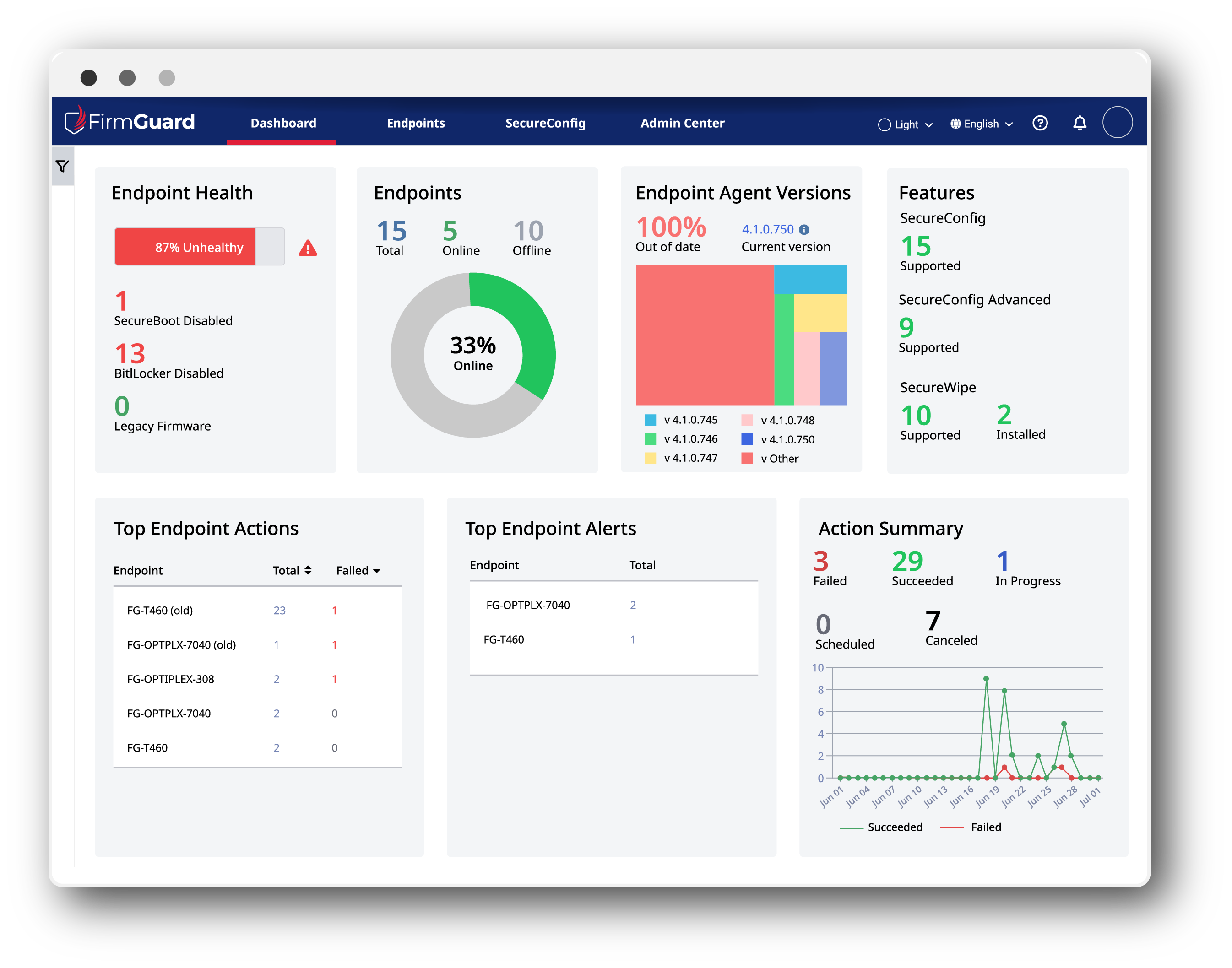Enterprise Firmware Security
Make sure your enterprise is secure at the BIOS firmware level: Prevent firmware breaches, ensure regulatory compliance, optimize efficiency




THE CHALLENGE
Why BIOS Firmware Is a Major Security Vulnerability for Enterprises
BIOS Firmware security vulnerabilities can open undetectable backdoors, allowing attackers to implant Bootkits that hijack operating systems or network communications. To safeguard your enterprise, it’s crucial to secure all endpoints, including hosts, servers, mobile devices, data centers, and IoT systems.

Firmware Visibility
Many organizations struggle to maintain an accurate inventory of all the firmware running on their devices, creating blind spots in their security landscape.
Without a clear understanding of what firmware is present, it’s impossible to protect against vulnerabilities.

Firmware Monitoring
Enterprises need to constantly track the status and behavior of their firmware to identify potential threats or abnormalities.
However, traditional security tools often lack the capability to monitor firmware effectively, leaving a critical gap. Advanced monitoring solutions are essential to detect malicious activities and ensure firmware integrity.
Insufficient Security Measures
Without security features like Secure Boot, unauthorized users can manipulate BIOS settings or inject malware.
Attackers can exploit weaknesses in the BIOS, leading to unauthorized access and system compromise. Addressing these vulnerabilities is critical for safeguarding sensitive data and maintaining overall security posture.
THE SOLUTION
Remotely Access & Secure Your BIOS Firmware
Enterprises often rely on legacy tools like antivirus software, EDR platforms, and basic network security, which focus on application-level threats but miss critical BIOS firmware vulnerabilities. Standard BIOS management tools offer limited visibility and control, failing to detect or remediate advanced firmware threats.
These tools provide general protection but lack the depth needed for comprehensive BIOS firmware security. Many companies mistakenly believe they’re “good enough,” underestimating the risk posed by this new attack-vector. For example, standard solutions often fail to detect if Secure Boot is disabled, leaving systems exposed.
If malware targets the BIOS, these tools offer no remediation, leaving your entire network and data at risk.
Enterprise Firmware Security: The Stats
THE FIRMGUARD PLATFORM
Why Enterprises Choose FirmGuard
Unlike other malware, BIOS firmware threats are persistent—they survive reboots and continue to reload until fully eradicated. FirmGuard is designed to tackle enterprise firmware security threats head-on, offering the specialized protection that traditional tools simply can’t provide.
Firmware Security
FirmGuard provides comprehensive enterprise firmware security solutions, ensuring complete protection for your enterprise’s firmware with advanced monitoring and threat detection capabilities. Our solutions enable you to manage, monitor, and mitigate BIOS firmware vulnerabilities, preventing breaches before they happen.
Regulatory Compliance
FirmGuard enables enterprises to easily navigate the complex landscape of regulatory requirements. Our solutions ensure that your firmware management adheres to industry standards and compliance mandates, reducing the risk of costly penalties and enhancing your overall security posture.
Technician Efficiency
FirmGuard streamlines firmware management through cutting-edge automation, significantly reducing manual intervention and operational overhead. Our efficient processes enable swift remediation and updates, allowing your security team to focus on strategic initiatives while maintaining robust security.
FirmGuard Use Cases
FirmGuard covers every BIOS vulnerability, providing the most advanced firmware security available.
SecureCheck
SecureCheck keeps track of all activities related to UEFI firmware and alerts administrators anytime something with respect to UEFI firmware changes.
SecureConfig
SecureConfig eliminates the need for physical access to endpoints for BIOS configuration as admins can now remotely adjust BIOS settings.
SecureUpdate
SecureUpdate provides a centralized, secure and standardized way to make UEFI BIOS firmware updates across endpoints, with minimal involvement from IT staff.
SecureWipe
SecureWipe enables an MSP to forensically erase all data independent of the OS, across endpoint HDD, SSD, and other mass storage devices.
SecureEndurance
SecureEndurance ensures uninterrupted visibility and control by preventing clients from accidentally or intentionally uninstalling critical FirmGuard agents without an authorized uninstall token.
SecureLock
SecureLock gives guaranteed compliance and stronger security by enforcing mandatory endpoint check-ins and locking devices at the BIOS level until an issued unlock code is entered.
SecureReimage
SecureReimage remotely restores endpoints from cloud, ensuring consistency, security, and efficiency in endpoint management.
SecureSense
SecureSense provides endpoint data on the system, CPU, memory, and storage. It detects Legacy BIOS Mode, tracks BitLocker status, and more.
SecureBeat
SecureBeat links the FirmGuard endpoint agent and Cloud Server via a secure, encrypted tunnel, supporting other FirmGuard features.
SecureSync
SecureSync delivers secure pre-OS connectivity over LAN or Wi-Fi, keeping endpoints reachable and controllable even when the OS fails or goes offline.
The Latest From FirmGuard
Before You Go
Subscribe to our newsletter & stay up to date with the latest developments in the world of BIOS firmware.




